A behavioral health disorder is a pattern of harmful thoughts, feelings, and behaviors that interfere with everyday life. It’s not just about feeling down or having a bad day—behavioral health disorders are real, serious, and complex.
Facts about behavioral health
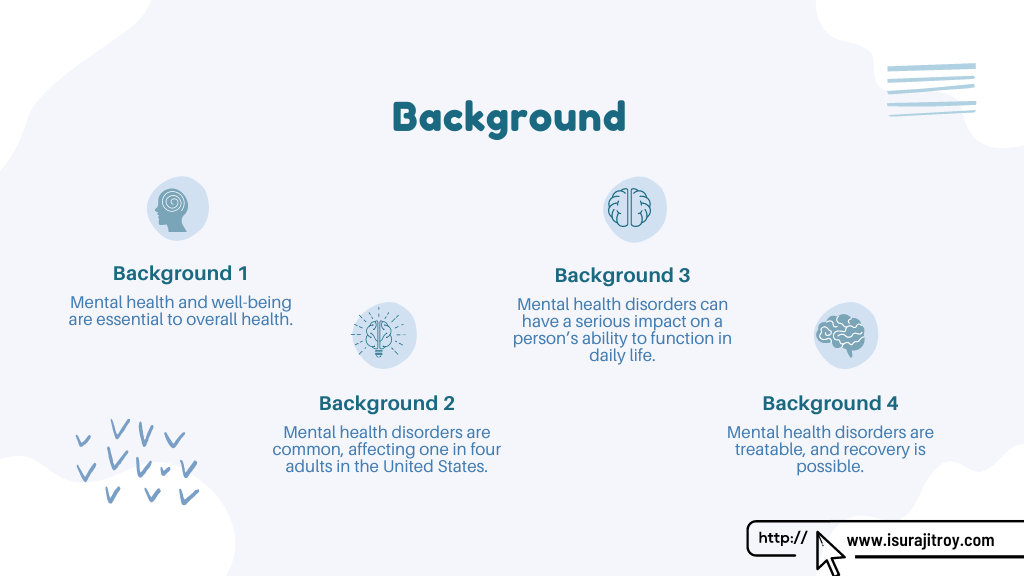
- According to the National Alliance on Mental Illness, one in five adults in the U.S. experiences mental illness in a given year.
- Suicide is the 10th leading cause of death in the U.S., with over 44,000 people dying by suicide each year.
- Anxiety disorders are the most common mental illness in the U.S., affecting 40 million adults.
- Depression is one of the most common mental disorders, affecting more than 16 million adults in the U.S.
- Bipolar disorder affects approximately 2.6% of the U.S. population.
- Schizophrenia affects approximately 1.1% of the U.S. population.
- Obsessive-compulsive disorder (OCD) affects approximately 2.2 million adults in the U.S.
- Post-traumatic stress disorder (PTSD) affects approximately 7.7 million adults in the U.S.
- Borderline personality disorder (BPD) affects approximately 1.6% of the U.S. population.
- Eating disorders affect approximately 30 million people in the U.S.
Anxiety and Behavioral health
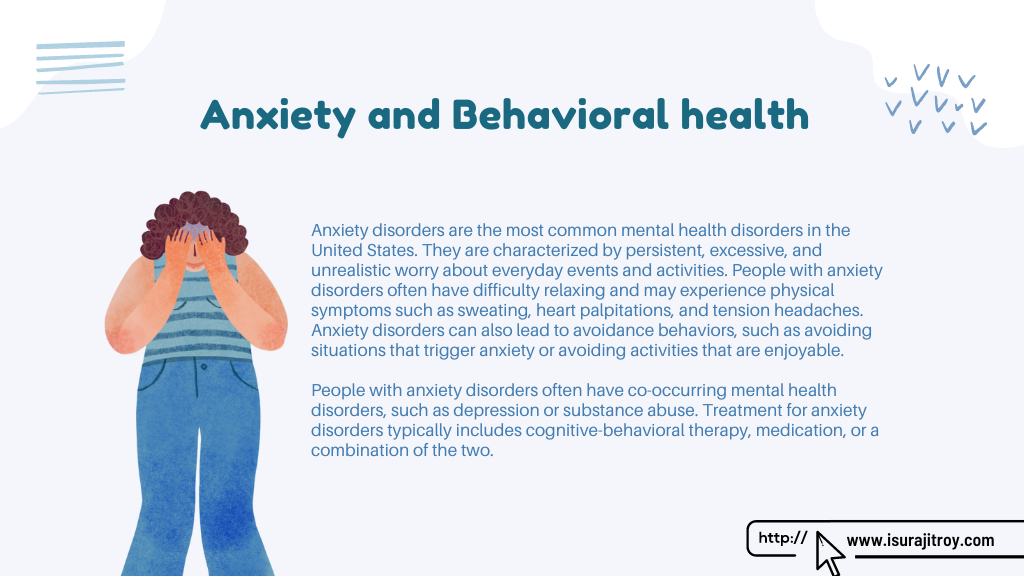
Anxiety disorders are the most common form of mental illness in the United States, affecting 40 million adults. That’s 18% of the population. Anxiety disorders are highly treatable, yet only 36.9% of those suffering receive treatment.
Anxiety disorders take many different forms. The most common are:
- Generalized anxiety. disorder (GAD).
- Obsessive-compulsive. disorder (OCD).
- Panic disorder.
- Post-traumatic stress disorder (PTSD).
- Social anxiety disorder.
- Specific phobias.
Symptoms of anxiety disorders can include:
- Excessive worry.
- Irritability.
- Muscle tension.
- Sleep problems.
- Fatigue.
- Difficulty
- concentrating.
Anxiety disorders can make everyday tasks seem impossible to complete. The good news is that there are effective treatments available. With treatment, most people with anxiety disorders can manage their symptoms and improve their quality of life.
Depression and Behavioral health
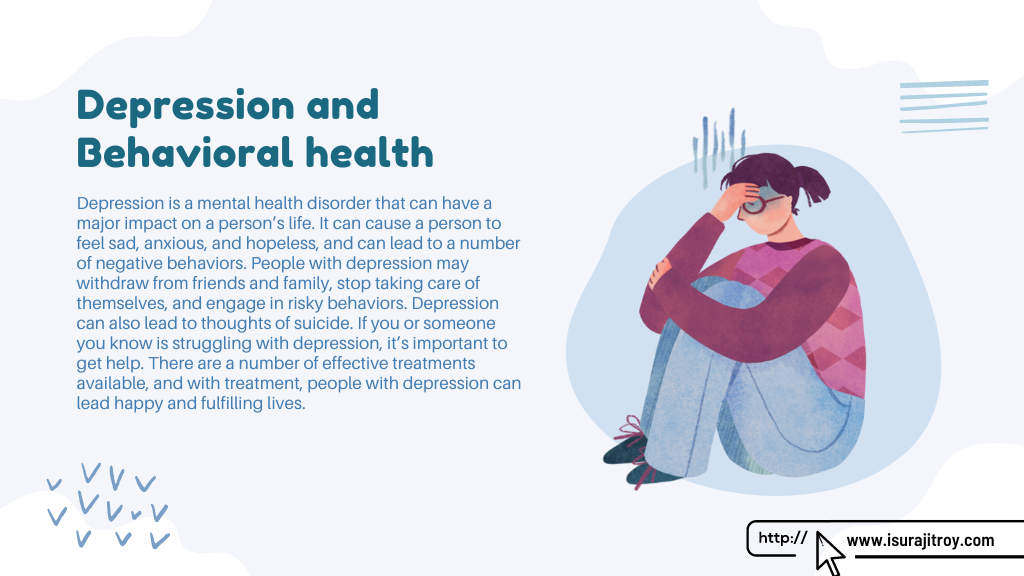
It’s no secret that depression can take a toll on your mental health. But did you know that it can also impact your physical health? Depression is a serious mental illness that can cause a variety of physical and behavioral health problems.
Depression can make it hard to take care of yourself. You may not feel like eating or exercising, and as a result, you may lose weight or become physically weak. Depression can also lead to insomnia or sleep problems, which can further impact your physical health.
Depression can also cause you to withdraw from your usual activities and social life. You may not feel like going out with friends or participating in activities you once enjoyed. As a result, you may become isolated and lonely.
Depression can also lead to risky behaviors, such as drinking too much alcohol, using drugs, or engaging in risky sex. These behaviors can further impact your physical and mental health.
If you’re struggling with depression, it’s important to seek help from a mental health professional. They can help you develop a treatment plan that can improve your symptoms and help you live a healthier, happier life.
Bipolar Disorder and Behavioral health
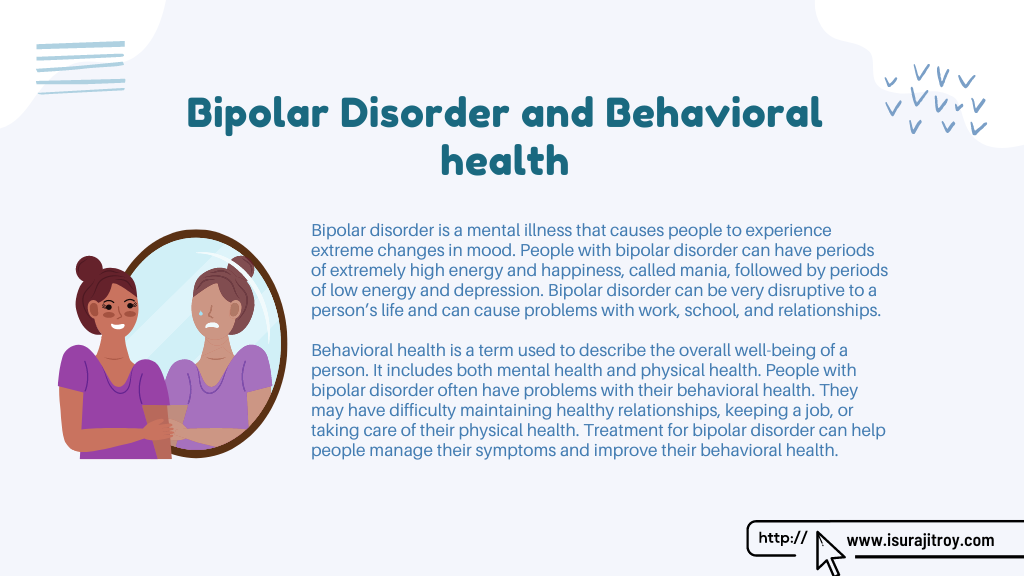
Behavioral health is a term used to describe the overall well-being of a person. It includes both mental health and physical health. People with bipolar disorder often have problems with their behavioral health. They may have difficulty maintaining healthy relationships, keeping a job, or taking care of their physical health. Treatment for bipolar disorder can help people manage their symptoms and improve their behavioral health.
Bipolar disorder is a mental illness that causes drastic changes in mood, energy, and activity levels. People with bipolar disorder experience high highs, called mania, and low lows, called depression. These mood changes can last for long periods of time, sometimes for months or even years.
Bipolar disorder is a complex condition that is not fully understood. However, it is thought to be caused by a combination of genetic and environmental factors.
Bipolar disorder can be a very debilitating condition. It can interfere with work, school, and relationships. It can also lead to substance abuse and suicide.
However, bipolar disorder is also a treatable condition. With proper treatment, people with bipolar disorder can lead healthy and productive lives.
If you or someone you know has bipolar disorder, there is help available. There are many resources available to help people understand and manage the condition.
Borderline Personality Disorder and Behavioral health
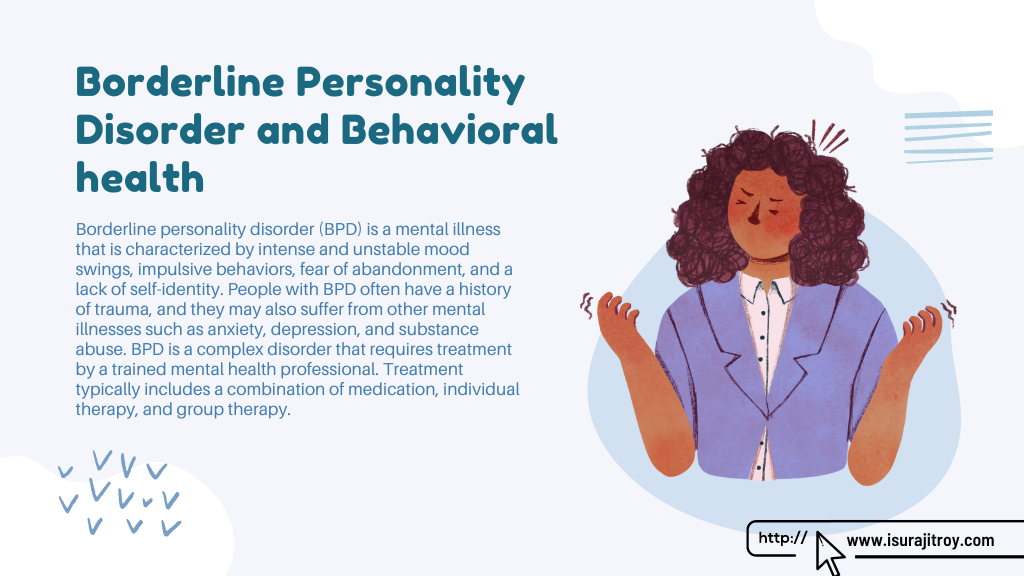
What is Borderline Personality Disorder?
Borderline personality disorder (BPD) is a mental illness that causes intense mood swings, impulsive behaviors, and severe problems with self-image and relationships. People with BPD often have a history of trauma, whether it’s physical, sexual, or emotional. Many times, this trauma is unresolved and can lead to further issues down the road.
BPD is one of the most common personality disorders, affecting about 1.6% of the adult population in the United States. It’s more common in women than men, and it often begins in adolescence or young adulthood.
While there is no cure for BPD, there are treatments that can help. If you or someone you know has BPD, it’s important to seek professional help.
What Causes Borderline Personality Disorder?
The exact cause of BPD is unknown, but it’s thought to be caused by a combination of genetic and environmental factors. People with BPD often have a family member with the disorder, which suggests that there is a genetic component.
Environmental factors, such as childhood trauma, can also contribute to the development of BPD. Studies have shown that people with BPD are more likely to have experienced physical, sexual, or emotional abuse during childhood.
What Are the Symptoms of Borderline Personality Disorder?
People with BPD often experience intense mood swings. They may feel happy one minute and then suddenly feel angry or depressed the next. These mood swings can be so severe that they interfere with everyday life.
Impulsive behaviors are also common in people with BPD. This can include engaging in risky behaviors, such as unprotected sex, driving recklessly, or abusing drugs or alcohol. People with BPD may also impulsively spend money, self-harm, or attempt suicide.
Many people with BPD also have a distorted self-image. They may see themselves as worthless or evil. They may also have a fear of abandonment and feel like no one can be trusted. These feelings can lead to problems in relationships.
People with BPD often have difficulty controlling their emotions. This can lead to outbursts of anger or violence. It can also make it hard to keep a job or maintain healthy relationships.
If you or someone you know has these symptoms, it’s important to seek professional help. BPD is a treatable condition, but it’s important to get help from a qualified mental health professional.
What Are the Treatments for Borderline Personality Disorder?
There is no cure for BPD, but there are treatments that can help. The most common treatment is psychotherapy, which can help people with BPD learn to control their emotions and impulsive behaviors.
Medications, such as antidepressants and antipsychotics, can also be helpful in treating BPD. These medications can help to stabilize mood swings and reduce impulsive behaviors.
If you or someone you know has BPD, it’s important to seek professional help. BPD is a serious condition, but it’s treatable. With proper treatment, people with BPD can lead happy and healthy lives.
Obsessive-compulsive Disorder and Behavioral health
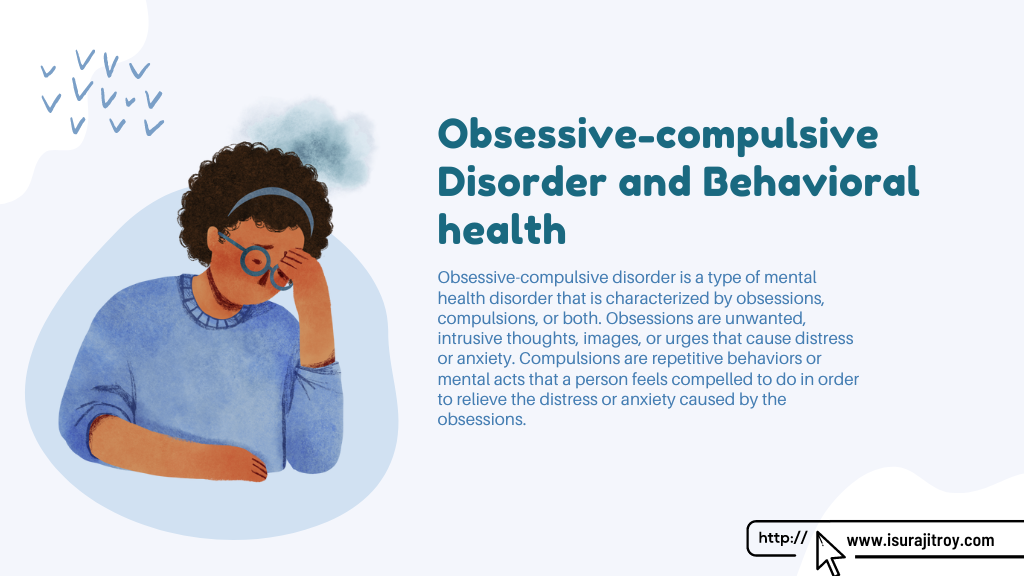
Obsessive-compulsive disorder (OCD) is a type of anxiety disorder. People with OCD have unwanted and repeated thoughts, feelings, images, or sensations (obsessions) that make them feel driven to do something (compulsions). This may involve repeating certain behaviors over and over (compulsions), or feeling like they have to perform certain rituals perfectly (compulsions).
OCD can cause a lot of distress. It can interfere with a person’s work, school, and social life. People with OCD may be afraid to leave home or be around people. They may avoid situations that trigger their obsessions, or they may try to neutralize their obsessions with other thoughts or actions (compulsions).
People with OCD may know that their obsessions and compulsions are unreasonable, but they feel unable to control them. OCD is a chronic (long-lasting) disorder, and it can be hard to treat. But with treatment, most people with OCD can get some relief from their symptoms.
WANT TO SUPPORT MY EFFORT?


Hello Everyone!
As some of you may know, I am a blogger and I absolutely love it. I have been blogging for about two years now and I absolutely love it. I have been able to connect with so many people and I have also been able to help out other bloggers as well.
However, blogging does take up a lot of time and effort and it can be quite costly. I am currently in need of some financial assistance in order to keep my blog up and running. I would greatly appreciate any donations that you could give.
Thank you so much for your time and generosity!
Post-traumatic Stress Disorder and Behavioral health
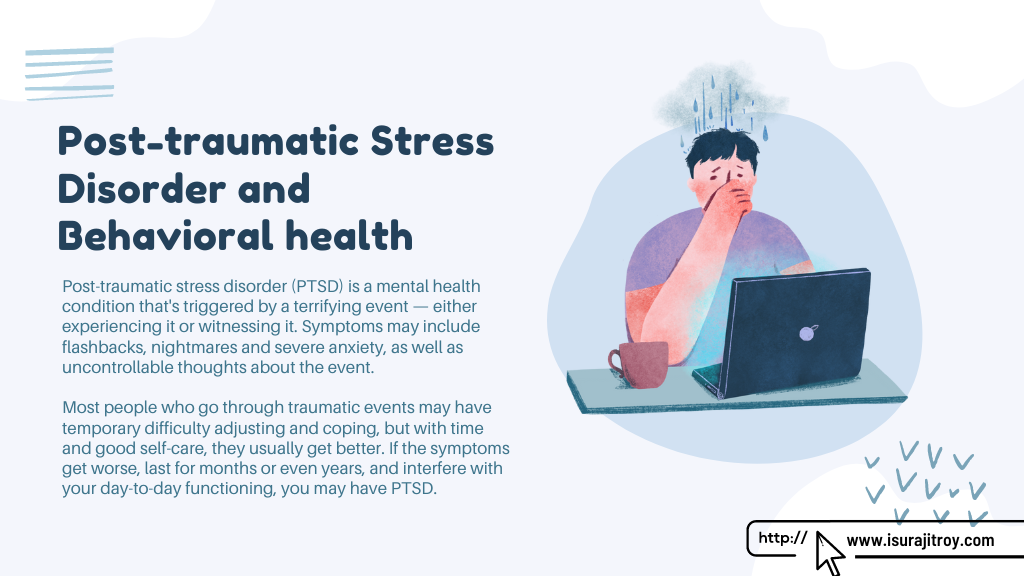
Most people who go through traumatic events may have temporary difficulty adjusting and coping, but with time and good self-care, they usually get better. If the symptoms get worse, last for months or even years, and interfere with your day-to-day functioning, you may have PTSD.
Most people associate post-traumatic stress disorder (PTSD) with military veterans, but this mental health condition can affect anyone who has experienced a traumatic event. Symptoms of PTSD can include intrusive memories, flashbacks, avoidance of triggers, negative changes in mood and cognition, and changes in physical and emotional reactions.
While the events that can trigger PTSD are varied, some of the most common include combat exposure, child abuse, sexual assault, and natural disasters. The condition can have a profound effect on a person’s life, impacting their relationships, work, and ability to function in daily life.
There is no one-size-fits-all approach to treating PTSD, but many people find relief with therapy, medication, and self-care. If you or someone you know is struggling with PTSD, reach out for help. There are many resources available to support you on your journey to recovery.
Eating Disorders and Behavioral health
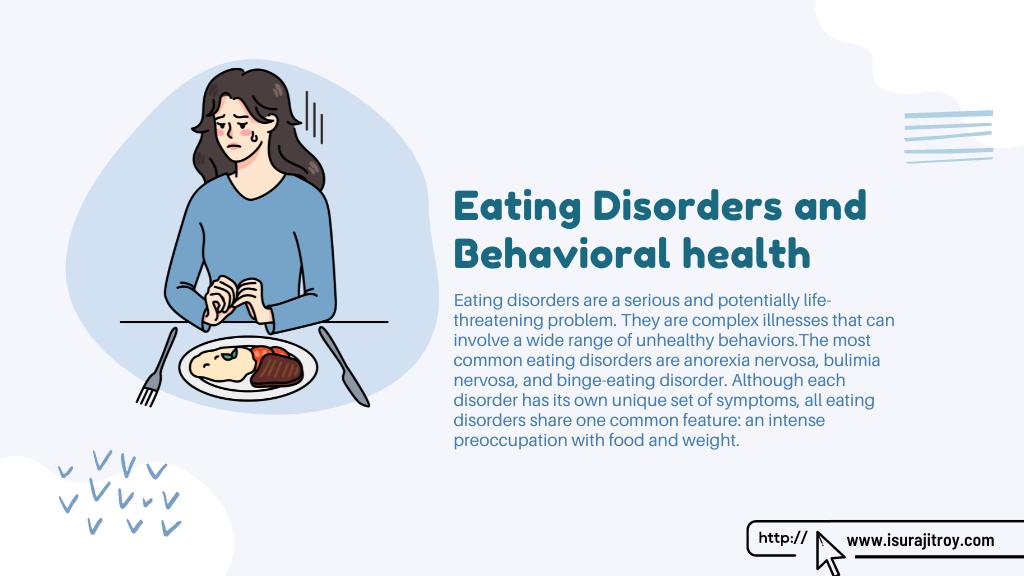
Eating disorders are a serious problem in the United States. In fact, they are one of the most common mental health disorders in the country. Eating disorders don’t just affect the way you eat, they also affect your mood, your behavior, and your overall health.
There are three main types of eating disorders: anorexia nervosa, bulimia nervosa, and binge eating disorder. Anorexia nervosa is characterized by a fear of gaining weight, severe calorie restriction, and extreme weight loss. Bulimia nervosa is characterized by binge eating followed by purging, either through vomiting or the use of laxatives. Binge eating disorder is characterized by regular episodes of binge eating, but without the purging.
Eating disorders can have a serious impact on your health. They can cause malnutrition, electrolyte imbalances, dehydration, and even heart failure. Eating disorders can also lead to social isolation, depression, and anxiety.
If you or someone you know is struggling with an eating disorder, there is help available. There are many treatment options available, including therapy, medication, and support groups. Recovery is possible, but it takes time and effort. If you’re ready to start your journey to recovery, please reach out for help.
Substance Abuse and Behavioral health
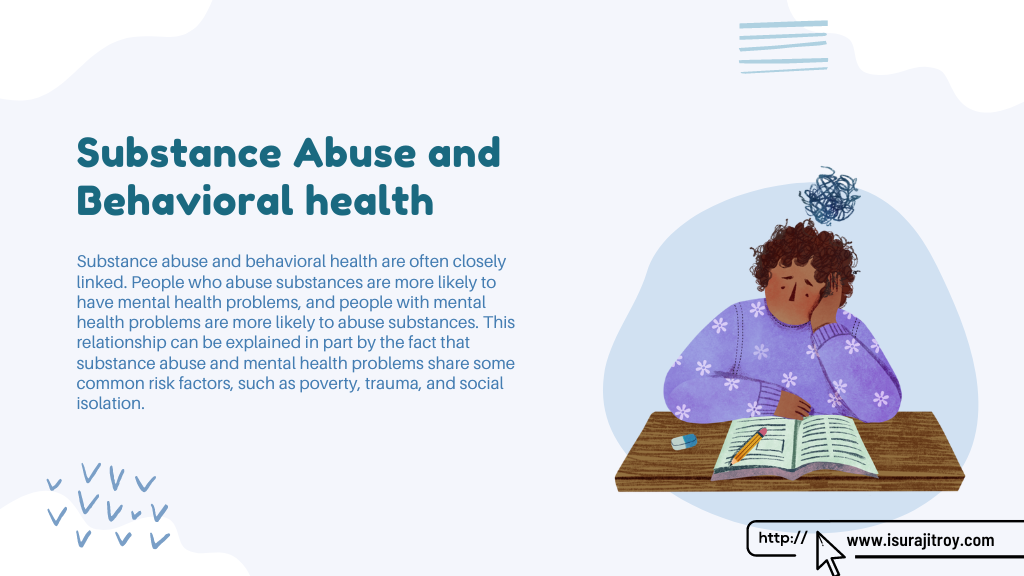
Substance abuse is a serious problem that can have a negative impact on behavioral health. It is important to be aware of the signs and symptoms of substance abuse so that you can get help if you or someone you know is struggling with this issue.
Some of the signs and symptoms of substance abuse include:
- Changes in mood or behavior.
- Withdrawal from friends and activities.
- Changes in appearance.
- Financial problems.
- Legal problems.
- Health problems.
If you or someone you know is displaying these signs, it is important to seek help from a professional. Substance abuse can lead to serious mental and physical health problems, so it is important to get help as soon as possible. There are many resources available to help those struggling with substance abuse, so don’t hesitate to reach out for help.
Gambling Addiction and Behavioral health
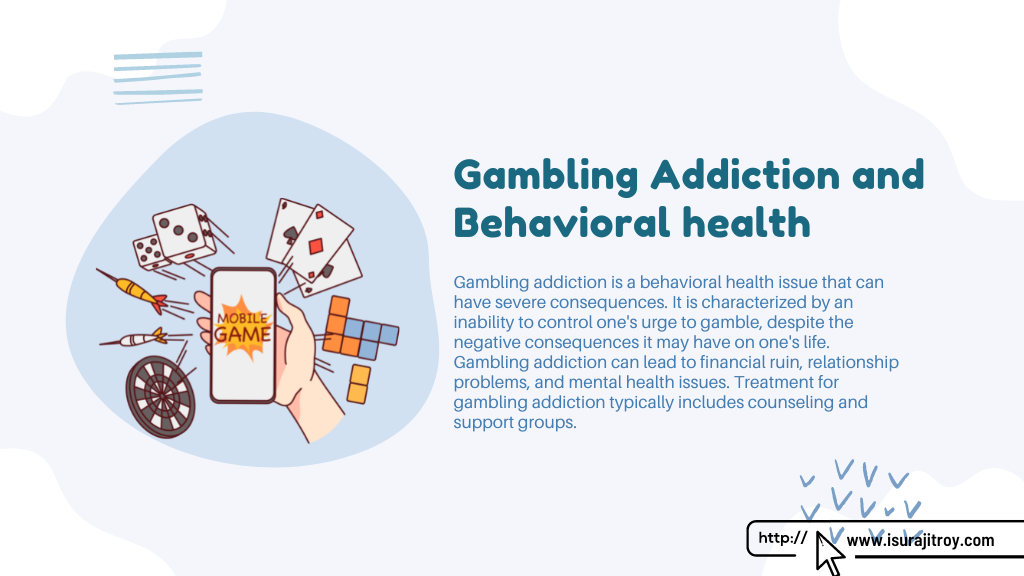
Gambling addiction, also known as compulsive gambling, is a type of impulse-control disorder. Compulsive gamblers can’t control the urge to gamble, even when they know their gambling is hurting themselves or their loved ones. Gambling addiction is a serious problem that can ruin lives.
If you or someone you know has a gambling problem, there is help available. Gambling addiction is a treatable disorder, and many people recover from it with the help of professional treatment.
If you think you might have a gambling problem, ask yourself the following questions:
- Do you gamble more than you can afford to lose?
- Do you need to gamble with larger amounts of money to get the same feeling?
- Do you gamble to escape from a boring or unhappy life?
- Do you gamble even though it has caused you financial, job-related, or relationship problems?
If you answered “yes” to any of these questions, you may have a gambling problem.
There are several warning signs of gambling addiction. If you’re preoccupied with gambling, spending more and more time and money on it, or gambling despite serious consequences, you have a gambling problem.
Gambling addiction can lead to financial ruin, job loss, family and relationship problems, and even suicide. If you have a gambling problem, get help now. There are many resources available to help you overcome your gambling addiction and get your life back on track.
Internet Addiction and Behavioral health
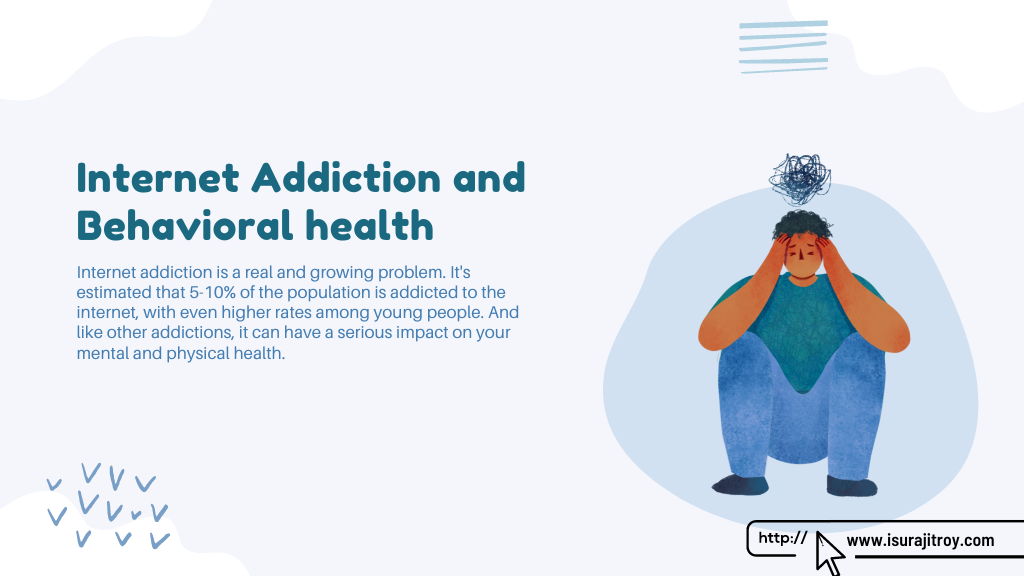
Internet addiction is a real and growing problem. Just like any addiction, it can have a major impact on your life, including your mental and behavioral health.
If you’re addicted to the internet, you may find yourself feeling restless, irritable, and anxious when you’re away from your computer or device. You may also start neglecting your responsibilities and the people in your life.
The good news is that there is help available. If you’re struggling with an internet addiction, there are treatment options that can help you get your life back on track.
Conclusion
Each type of disorder has its own symptoms, but all of them can cause significant distress and impair your ability to function in work, school, and personal relationships.
Behavioral health disorders are common—nearly one in five adults in the United States lives with one. But only about half of those people will get treatment.
Treatment for a behavioral health disorder usually involves talk therapy, medication, or both. With treatment, most people with a disorder can find relief from their symptoms and live a healthy, productive life.




